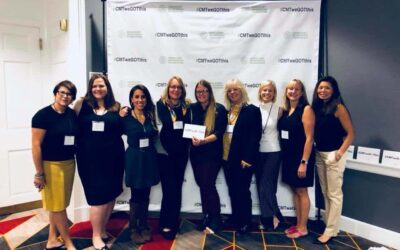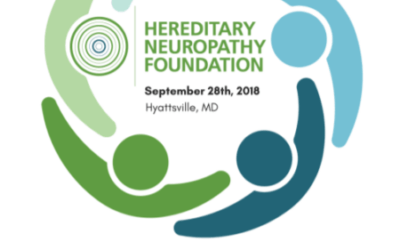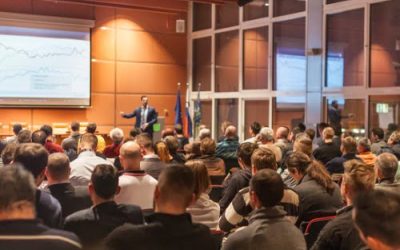NEW YORK, November 29 /PRNewswire-USNewswire/ — The Hereditary Neuropathy Foundation (HNF) will be holding a landmark externally-led Patient-Focused Drug Development (PFDD) Meeting for Charcot-Marie-Tooth (CMT) and related inherited neuropathies (INs) in Washington, D.C. on Friday, September 28, 2018. The meeting will be held in conjunction with September National CMT Awareness Month. HNF was accepted by the U.S. Food and Drug Administration (FDA) under the agency’s externally-led PFDD initiative to host this meeting on behalf of the hereditary neuropathy community. Patients, treatment developers, healthcare providers, and regulatory professionals from the FDA will be in attendance to focus on the needs of this rare neuromuscular disease community, which impacts 1 in 2,500 (adults and children) in the U.S. and 2.6 million people worldwide.
PFDD meetings integrate patient insights into the drug development process. Learnings will help inform clinical trials, and could potentially be used to assess other therapies to evaluate the benefits of seeking additional indications. This groundbreaking meeting will include facilitated panel discussions designed to provide the FDA with perspectives from people with hereditary neuropathies, advocates and caregivers. Following the successful model that the FDA developed to host similar meetings, the day will focus primarily on a range of patient viewpoints on CMT/INs, covering the symptoms and impacts to daily life that are most important to patients and patients’ perspectives on existing and future treatments. This input can help inform the FDA’s decisions and oversight during drug development and the review of marketing applications for new drugs.
Allison Moore, HNF Founder/CEO, stated, “This is an unprecedented time for our community: with the first-ever CMT clinical trials already in late stages and more clinical trials on the horizon in 2018, we must take action now to educate the FDA and other stakeholders in the drug development process on the impact that CMT/INs have on patients’ and their families’ lives and quality of life to ensure their perspectives are considered throughout the drug development continuum.” Moore continued, “It is also critical that we document the impact new therapies could have on mortality rates and disease severity among those patients with the fatal disease phenotypes.”
HNF is inviting all advocacy and stakeholders in the CMT community to join this meeting to advocate for the needs of the CMT/IN patient community. Patient voices are critical in understanding how to develop and approve therapies that provide clinical and meaningful benefit to those living with CMT. Bringing the voices of patients, caregivers, and advocates to the conversation will produce the data and documentation needed to publish a summary of the day’s proceedings in the form of a “Voice of the Patient” report that can be used by FDA leadership as well as other stakeholders in the drug development process. This meeting also serves to address industry’s concerns regarding committing resources to drug therapy development related to the gaps in patient-reported data, clinical natural history studies, risk-benefit assessment and validated clinical outcome measures that are sensitive to capture disease progression and/or improvement. The learnings of a patient-led meeting will help to document CMT/INs patients’ experiences to further define the devastating effects of living with this debilitating disease.
HNF has been active in pursuing stakeholders (industry) that agree there is a commercialization opportunity for drug development; however, data gaps are blocking translation. Furthermore, finding additional disease mechanisms, targets, and biomarkers are important for many of the rarer types impacting young children and adolescents. An improved understanding of patients’ impaired function presents a critical path to the future of therapy development.
With these learnings, it will be possible to implement outcome measures that will capture what matters most to patients. Disease manifestations are not always equal among patients, so patients’ perspective on the significant impact on activities of daily living and quality of life (QoL) helps to develop guidelines and reporting for patient-focused research initiatives.
For more information about the PFDD meeting, to get involved, and/or to become a meeting sponsor, please contact Allison Moore at [email protected].
About Hereditary Neuropathy Foundation
Hereditary Neuropathy Foundation (HNF) is a US non-profit 501(c)3 organization whose mission is to increase awareness and accurate diagnosis of Charcot-Marie-Tooth disease (CMT) and related inherited neuropathies, support patients and families with critical information to improve quality of life, and support research. HNF has notably developed the Therapeutic Research in Accelerated Discovery (TRIAD) program, a collaborative effort with academia, government, and industry to support and develop treatments for CMT. For further information, visit www.hnf-cure.org.
About Charcot-Marie-Tooth (CMT)
CMT is one of the most common inherited nerve diseases, characterized by severe disability, deformity, and significant impacts on quality of life. CMT affects an estimated 1 in 2,500 people (adults and children) in the United States and 2.6 million people worldwide (although experts believe the number could be much higher). CMT is also commonly called hereditary sensory and motor neuropathy because of its impact on the sensory as well as the motor nerves. Researchers recognize five main types of CMT disease and many sub-types, with research still underway to define all of the different types fully and researchers still discovering additional gene involvement. The disease is usually passed on from parent to child; in the most common type, CMT1A, there is a 50 percent chance of the child inheriting the condition. Recent testing has found some people have the faulty genes, but their parents do not.








This is to get “patient insight into the drug development process.” Since when has that ever been an input in the drug development process? Is that what got us neurontin and Lyrica? It’s all about money and apparently not enough of us to be a profitable venture. The push to get us help has always been slow if at all. Even this announced conference is 10 months and 2500 mi away. Seems all in NYC or east coast. Been difficult to accept increasing disability when you work so hard on your own to get better because healthcare offers you nothing but drugs to sedate your nerves, body, and mind. Maybe you just want to give hope and a forum to complain. I get better insight sharing with others on your blog not with researchers or drug companies. Hope this is at least free
How can I get my children involved in the clinical study. I have two children with CMT. My daughter is 14 and my son is 17. Their disease is progressing rapidly. I’m desperate to help them!